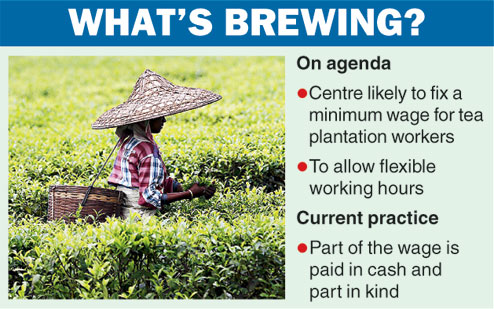Calcutta, May 22: The Centre may soon fix a minimum wage for plantation workers in tea-growing states, besides allowing flexible working hours, mainly during the harvesting season.
"Every worker must be paid a minimum wage. Also, we must do away with the system of paying a part of the wage in cash and a part in kind as certain items that are given are sub-standard," said Shankar Aggarwal, secretary in the ministry of labour and employment.

"We have been demanding an implementation of a minimum wage for a long time and we are happy that the Centre is considering it now," Alok Chakravarty, Darjeeling district president of the Indian National Trade Union Congress, told The Telegraph.
Around 23 lakh plantation workers are employed in about 6,00,000 hectares of tea-cultivated area across 16 states.
The Indian Tea Association (ITA), however, did not support the move to abandon the "kind" component.
"A definition of wages must recognise 'wages in kind' provided by the planters to the workers while evaluating the same," said Arijit Raha, secretary-general of the ITA.
"The Minimum Wages Act, 1948, allows a payment of wages in both cash and kind. Also, the International Labour Organisation's recommendations authorise an inclusion of wages in kind and endorse the need to take account of the non-wage benefits accruing to the workers," Raha said.
This benefit has been in existence since the implementation of the Plantation Labour Act, 1953. The component was introduced because both the Centre and states failed to provide any facilities to tea workers and backward communities. So, the producers were to provide facilities such as housing and sanitation.
The state and the Centre have now come up with various social welfare schemes. Government-appointed committees have recommended to implement the same for tea estates. However, to implement these schemes, its eligibility criteria have to be modified. The schemes cater to the below-poverty-line workers that does not include tea workers.
The ministry also said that as tea plantation was an organised sector, the planters have to continue providing social security to workers, including an old age pension.
Another group of producers feel that by providing the "kind" benefit the industry would be able to retain its workforce, and this is where estates differ from bought leaf factories, which provide only cash wages to its workers.
"No industry provides such facilities as this one does to its workers," C.S. Bedi, MD of Rossell India, said.
The ministry also said it was open to an issue of flexible working hours as it wanted producers to improve efficiency, productivity and quality, but not at the cost of workers' interest.
"We have urged that the provision for weekly hours be increased during harvest as the industry has to cope with an unprecedented quantum in harvesting leaf for which processing and manufacturing necessitates prolonged working hours to maintain the quality of the produce," said P.K. Bhattacharya, secretary-general of the Tea Association of India.










